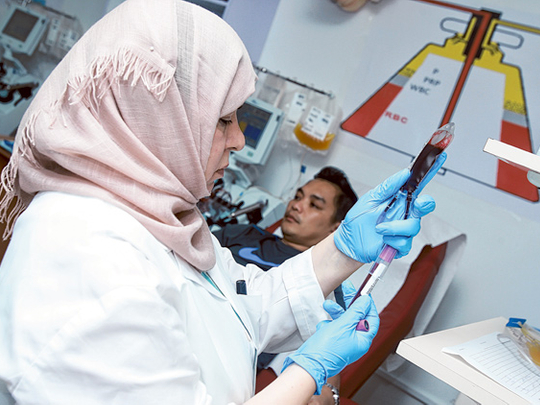
Dubai: There’s no room for complacency when it comes to keeping up the good work in terms of blood donation campaigns.
Blood banks may be fully replenished today but just one massive accident can exhaust supplies drastically. The bus crash on Emirates Road in May that killed 13 workers and injured 15 others led to just such a crunch.
Fortunately, blood donation campaigns throughout the city — about 45 per month — never stop and regular donors can be tapped in cases of emergencies, said Dr Laila Al Shaer, head of the Dubai Blood Donation Centre.
“The need for blood is growing while the population is growing. We need more blood every year. Now, we have enough, but I cannot trust that what we have this year will be enough for next year. So still, we need more donors,” Dr Laila told Gulf News.
As countries around the globe pay tribute to blood donors today (June 14) on the occasion of World Blood Donors Day, Gulf News looks into how selfless men and women in Dubai provide a life-saving service for others by giving their blood without expecting anything in return.
The Dubai Blood Donation Centre currently has more than 80,000 regular donors who donate blood at least twice a year — a result of increased awareness on the importance of blood donation. Many of them are individuals from the public and private sectors who have made it their “duty” to help others by donating blood.
“Our donors are very loyal to the community. They are cooperative. They come from different nationalities and donate for different nationalities who they don’t know. So it’s really a humanitarian work,” Dr Laila said.
Dr Laila said Dubai’s donors are easy to reach even when there’s an emergency.
“Rarely do we feel that they are reluctant to come, but we can put a percentage, 20 per cent might happen. But majority, 80 per cent of them do come, and we really appreciate that, especially with Rh group negative, O negative, they are willing to come.”
In fact, they are pro-active when it’s their schedule for donations.
“Sometimes we get a call or a message saying that, ‘No one called me. My interval is due.’ I am so astonished when they tell us, ‘No one sent me any message.’ But we don’t call them unless we need them because sometimes you are saturated with that blood group.”
Last year, the centre collected 42,824 units of blood, up by 800 units from 2012. Out of these, 40 to 42 per cent go to about 500 patients at the Thalassaemia Centre who need fresh blood supply every three weeks, depending on their haemoglobin levels.
Trauma patients such as accident victims and burn patients, women giving birth, and other patients with blood needs share the rest of the blood supply.
To date, there is no alternative source for this precious biological resource other than human donors.
That is why appreciating them for one day can never be enough, but it’s a good start.
“Donating money is different from donating blood. We have to send appreciation to all donors even if they donated just once, that we are proud of what they have done and I’m sure that it saved a life or at least attempted to save a life.
“And when you give your blood, you are doing a great job. And even if we say a big ‘Thank you,’ still it’s not enough.”












